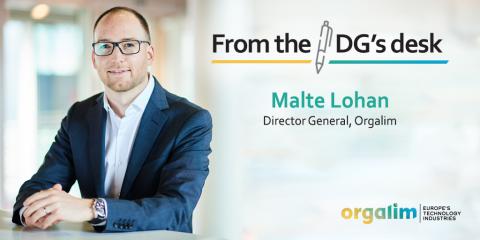Industry at the heart of a reinvigorated European economy
8 August 2019

This is part of a series looking at the priorities of the European Council and President-Elect of the European Commission ahead of the start of a new legislative term in the autumn. Orgalim Director General Malte Lohan discusses how Europe’s technology industries can support EU policymakers in delivering on the policy objectives that matter most to European citizens.
For a long time, the European project was synonymous with economic growth: rebuilding national economies after the Second World War, boosting cross-border trade through the European Economic Community, and the crowning achievement of the Single Market – giving EU industry unprecedented scope to expand and grow, and European consumers a whole new world of choice and value. But since the financial crisis a decade ago, that confidence has been shaken. For the first time in years, the future of current generations seems less secure than that of their parents. And faith in the promise of European collaboration is wavering as a result.
So it is right for the European Council to prioritise the need to develop the EU’s economic base, and for President-Elect von der Leyen to foreground “an economy that works for people”. But I would go a step further and argue it is not one priority among many, but rather the prerequisite for achieving all other objectives. Without a solid economic foundation, the whole edifice becomes shaky: beyond the impact on payslips or the job market, it becomes difficult to uphold social safety nets – let alone to source the much-needed investment in solutions to address climate change, demographic transition and digital transformation.
Industry is and will remain the cornerstone of a strong economic foundation. We cannot underestimate its role as an engine for the economy more broadly. The technology industries alone generated turnover of more than €2,000 billion last year, growing ahead of the EU as a whole. Beyond the numbers, our industries make an even more broad-ranging impact through innovations in areas like digital transformation in production that boost competitiveness across sectors. Not to mention the 11 million people across Europe directly employed by our sectors, with millions more jobs linked to related support and services. This is generally good-quality, well-paid employment – precisely the kind of jobs Europe’s youth have been sorely lacking in the last decade.
How can policymakers harness this potential and put it to work for Europeans over the next five years? Many of the elements needed are already spotlighted in the priorities both of the European Council and the Commission’s President-Elect: making Europe fit for the digital age, focusing on the Single Market as part of a comprehensive and coordinated industrial policy, creating a more attractive investment environment. And looking to the current geopolitical context, we should not overlook the role of the ‘European model’ – based on a particular set of values like free and fair competition, an open approach to trade, and a focus on collaboration – as a long-term competitive differentiator (without being naive in the short term that the rules of the global game are being reshaped in a way that is not always in our interest).
Orgalim’s ‘2030: an industry vision for a renewed Europe’ sets out a number of recommendations to get there: from embracing innovation-led transformation through an ambitious approach to digital innovation and the data framework, to enabling European industry’s long-term leadership by recommitting to the Internal Market, pursuing a bold trade agenda and investing in applied R&D&I.
If policymakers can get the framework right for industry to deliver on this, we will together shape an economy that works for all Europeans – helping restore citizens’ faith in the EU to deliver on its promise of prosperity and growth for generations to come.